One of Ukraine's most prominent billionaires Ihor Kolomoisky arrives at a Kyiv court on Sept. 2, 2023. The arrest of such a wealthy and influential businessman was unprecedented.STRINGER/Reuters
Before Russia’s invasion of Ukraine almost two years ago, the idea of a Ukrainian oligarch languishing behind bars was unthinkable, laughable even. The country’s oligarchs, like their Russian counterparts, were generally considered above the law, in good part because they, in effect, owned the law. They backed sympathetic politicians or were politicians themselves; some were widely suspected of bribing influential members of the judiciary.
The oligarchs’ reputation for being untouchable vanished in September, when Ihor Kolomoisky, the tycoon who was an open supporter of Volodymyr Zelensky in the run-up to his 2019 presidential victory, was detained by the Security Service of Ukraine (SBU). The arrest of such a wealthy and influential businessman was unprecedented.
The SBU, the Bureau of Economic Security (BEB) and the National Anti-Corruption Bureau of Ukraine (NABU) accused him of a laundry list of crimes, the biggest of which was the alleged looting in the last decade of PrivatBank, the country’s largest bank, co-founded by him in the 1990s.
He was also under investigation in the United States by the FBI and the Department of Justice. As his once-vast media, energy and banking empire falls apart, he remains under detention while pretrial investigations continue.
While no other oligarch is in detention in Ukraine, there is no doubt that the power of the dozens of billionaires who controlled some of the country’s key industries is waning – and fast.
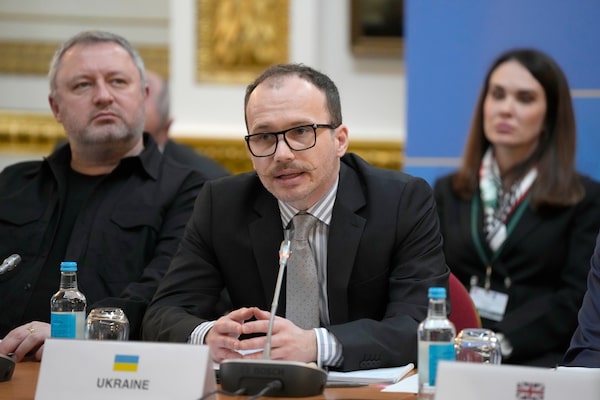
Denys Maliuska, Ukraine's Minister of Justice, attends the Justice Ministers' conference in support of the International Criminal Court (ICC) and the investigation into the situation in Ukraine, in London, on March 20, 2023,Alastair Grant
With the war came martial law, which sidelined parliament and downgraded the oligarchs’ political power. Laws passed during Mr. Zelensky’s anti-corruption campaign in the last few years forced many of them to sell or shut down their broadcasting businesses and other assets to avoid official “oligarch” status. Behind the clampdown is Ukraine’s effort to clean up its act to ease the country’s aspiration to join the European Union; accession talks have recently begun.
“The oligarchs’ influence on the government has significantly decreased,” Ukraine’s Minister of Justice Denys Maliuska told The Globe and Mail in an interview in late January. “No one was able to prosecute them before. They bribed everyone and were quite ruthless.”
But the Ukrainian government is not declaring victory over the oligarchs quite yet – “I cannot say we do not have corruption anymore,” Mr. Maliuska said – and knows it has a lot to prove before it can join the EU club.
In the autumn, former European Commission president Jean-Claude Juncker dismissed Ukraine as a fraud machine. “Anyone who has had anything to do with Ukraine knows that this is a country that is corrupt at all levels of society,” he said in an interview with the German newspaper Augsburger Allgemeine. “Despite its efforts, it is not ready for accession. It needs massive internal reform processes.”
The Forbes list of the richest people in the world reveals that, on paper at least, the Ukrainian oligarchs’ best days are over. The Ukrainian edition of Forbes magazine calculated in late 2022 that the combined wealth of the Top 20 billionaires roughly halved, to US$22-billion, since the start of the invasion.
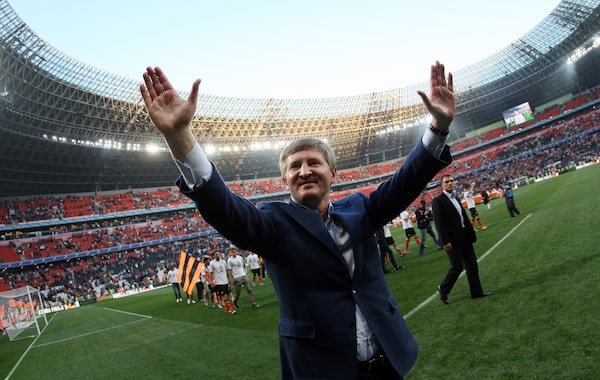
Rinat Akhmetov, owner of the metals group Metinvest and DTEK, the biggest private electricity generator in Ukraine, at a FC Shakhtar Donetsk match in April 2013.AFP/AFP/Getty Images
The biggest loser was Rinat Akhmetov, owner of the metals group Metinvest and DTEK, the biggest private electricity generator in Ukraine. Two of his biggest steel plants were destroyed in the horrific battle for Mariupol, in the southeast corner of Ukraine, which was overrun by Russian forces in May, 2022. DTEK’s power plants and transmission system have come under regular Russian attack, triggering blackouts and killing employees.
Forbes estimated Mr. Akhmetov’s wealth shrank to US$4.4-billion from US$13.7-billion, though he is still Ukraine’s richest man. (In second and third place, respectively, were the Ukraine-born Canadian entrepreneurs Maxim Lytvyn and Alex Shevchenko, two of the three co-founders of Grammarly, the writing and editing app.)
Before the war, the Ukrainian oligarchs’ power was formidable. Generally speaking, they are a somewhat younger breed than the Russians ones, according to Sevgil Musayeva, the Ukrainian editor-in-chief of the online newspaper Ukrainska Pravda and one of Time magazine’s Top 100 most influential people of 2022.
The Russian oligarchs came to power shortly after the Soviet Union collapsed in 1991, amassing spectacular wealth from buying businesses such as refineries and smelters on the cheap – or allegedly stealing them.
Their Ukrainian counterparts mostly rose to power in the following decade using similar techniques. The Ukrainians in a sense had more freedom than the Russians. They competed with one another, boosted their influence by entering politics – many of the richest became members of parliament or regional governors – and were not beholden to Ukraine’s presidents in Kyiv.
“They became part of the political system,” Ms. Musayeva said. “They had their TV channels, their political players and financed political parties.”
By contrast, Russian oligarchs largely fell in line with President Vladimir Putin, who insisted that they not amass political power and made life difficult for those who tried. One of Russia’s richest oligarchs, Mikhail Khodorkovsky, founder of the now-defunct oil giant Yukos, made the mistake of criticizing the Kremlin and was charged with fraud in 2003. He spent a decade in prison.
Some Ukrainian oligarchs were suspected of adding lashings of cruelty to their power. Few know this better than Valeria Gontareva, who was the chief of the National Bank of Ukraine, the central bank, from 2014 to 2017. She shut down dozens of banks that were suspected of being the victims or conduits of criminal activity.
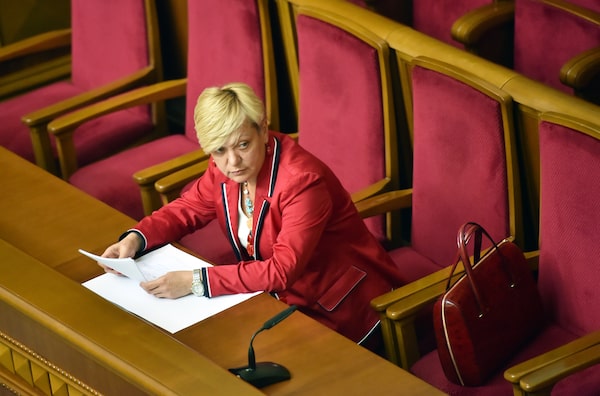
Valeria Gontareva, former chief of the National Bank of Ukraine, during a parliamentary session in Kyiv in August 2014.SERGEI SUPINSKY/AFP/Getty Images
The remains of Valeria Gontareva's family home in Kyiv, which burned to the ground in September 2019. Ms. Gontareva told the media that she believed this and prior incidents were tied to Mr. Kolomoisky, who has denied the allegations.SERGEI KARAZY/Reuters
Mr. Kolomoisky’s PrivatBank was her biggest target. Investigations in 2015 and 2016 discovered a gaping hole in the bank’s balance sheet, and it cost the government US$5.5-billion to fill it, equivalent to 6 per cent of the country’s gross domestic product.
It was after she left the central bank that her problems started. In 2019, she was hit by a car in London, an apparent attack that broke some of her bones and landed her in hospital. Ten days later, her daughter-in-law’s car was set on fire in front of the family home in Kyiv. The house itself burned to the ground shortly thereafter. Ms. Gontareva told the media that she believed the incidents were tied to Mr. Kolomoisky, who has denied that allegation and all others against him.
Investigators at NABU – Ukraine’s national anti-corruption bureau – are finding their jobs easier to do in the Zelensky era and are piling pressure on oligarchs they suspect of criminal activity. The investigation into PrivatBank continues, as do the probes into various oligarchs’ offshore holdings.
“Before the war, it was very, very hard to investigate the oligarchs,” said Oleksandr Skomarov, the head of NABU’s detectives’ department who is working on the PrivatBank case. “They had big institutional powers, bribed judges, and witnesses were afraid to testify against them.”
Ihor Kolomoisky’s PrivatBank was a big target of Valeria Gontareva's investigations. In 2015 and 2016, she discovered a gaping hole in the bank’s balance sheet, and it cost the government US$5.5-billion to fill it.Gleb Garanich/Reuters
Two crucial laws passed under Mr. Zelensky, both of them supported by international institutions such as the International Monetary Fund.
The first, in 2020, blocked the return of the 80 or so nationalized or insolvent banks, notably PrivatBank, to their previous owners, many of whom were oligarchs. Appropriately, the legislation was known in parliament as the “anti-Kolomoisky act.” The oligarchs fought the law, and some Ukrainian legal experts considered it unconstitutional. Others criticized its failure to provide a route for the repayment of the government bailouts. Still, it came into force.
The second – the “anti-oligarch law” – ranked as Mr. Zelensky’s biggest anti-corruption move. He pushed the law through parliament in 2021, just after his team of legal Rottweilers went after Viktor Medvedchuk, a pro-Russian oligarch with close ties to the Kremlin who was accused of funnelling money to Russian-backed separatists in eastern Ukraine. His assets were frozen, and his three TV channels were shut down. (In 2022, the first year of the war, Mr. Medvedchuk was handed over to Russia as part of a prisoner exchange.)
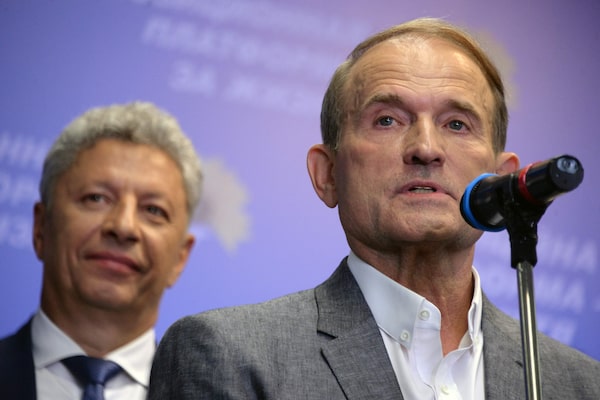
Viktor Medvedchuk, a pro-Russian oligarch with close ties to the Kremlin who was accused of funnelling money to Russian-backed separatists in eastern Ukraine.VASILY MAXIMOV/AFP/Getty Images
The law enacted an oligarch registry. Wealthy men or women meeting three of four criteria – wealth over about US$75-million; ownership of a monopoly; participation in politics; and significant media influence through ownership of, say, TV channels – would appear on the registry and have to declare their assets. “Many of them made moves to avoid being recognized as oligarchs,” Mr. Maliuska, the Justice Minister, said.
Some of the oligarchs, including Mr. Akhmetov and Petro Poroshenko, who was Mr. Zelensky’s predecessor as president, were quick to unload their TV businesses. Others, including Vadim Novinsky, the pro-Russian oligarch behind Ukraine’s diversified Smart Holding Group, gave up his seat in parliament.
Critics have dismissed the law as a “populist” move by Mr. Zelensky, adding that it was discriminatory, since it applied only to the wealthy, not to every citizen. Others said it could be manipulated, punishing entrepreneurs that the President’s office considered political opponents. While the law has never been fully implemented, it has been effective at reining in the oligarchs and crimping their influence on the judiciary and parliament.
Cutting the power of the oligarchs, or trying to, is one part of the effort to speed up Ukraine’s EU membership. Another is cleaning up the judiciary, including the Constitutional and Supreme courts of Ukraine, both of which have become entangled in sleaze scandals.
In May, 2023, the head of the Supreme Court, Vsevolod Kniaziev, was dismissed following his detention for allegedly taking a US$2.7-million bribe. Meanwhile, Mr. Zelensky last year signed a new law allowing the international oversight of Constitutional Court appointees to ensure their impartiality.
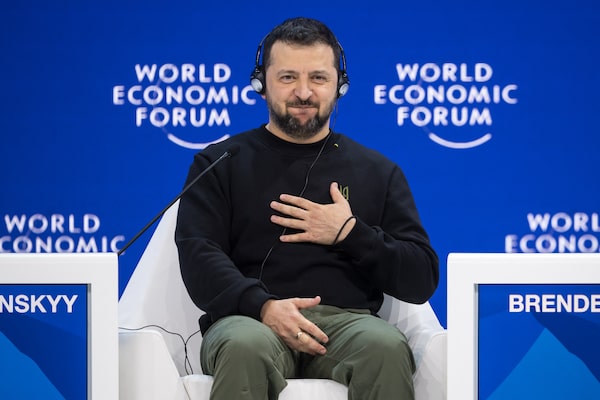
Ukrainian President Volodymyr Zelensky addresses the assembly at the World Economic Forum (WEF) annual meeting in Davos, on Jan. 16.FABRICE COFFRINI/Getty Images
While it appears the oligarchs have been beaten down and largely back Mr. Zelensky’s war against Russia, Ukraine still has a long way to go before the EU welcomes the country with open arms. Fresh corruption scandals erupt with alarming regularity, reminding the EU and the NATO countries that support Ukraine with munitions – as well as the International Monetary Fund (IMF) and the World Bank, which supply funds – that corruption is alive and well in the country.
In January, the Security Service of Ukraine (SBU) said that current and former Ukrainian Defence Ministry officials and managers of a weapons supplier, Lviv Arsenal, stole US$40-million that was meant to buy mortar shells for the military. The SBU alleged that the money was paid to Lviv Arsenal but that the shells were never delivered.
Still, there is little doubt that Ukraine is cleaner than it was when the oligarchs treated the judiciary, the parliament and key industries as their private fiefdoms.
“I think all our efforts in recent years are delivering good results,” Mr. Skomarov, the NABU detective, said. “We are showing we have the will to fight corruption, and we really want to join the EU.”
 Eric Reguly
Eric Reguly